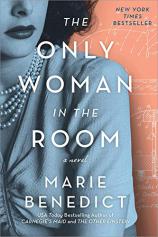Reading Group Guide
Discussion Questions
The Only Woman in the Room

1. As THE ONLY WOMAN IN THE ROOM opens, Hedy’s father expresses concern for his daughter’s welfare --- for all Jewish people, really --- in the wake of Hitler’s desire to annex their home country, Austria, to the overtly anti-Semitic Germany. Hedy views this as a problem faced by the Ostjuden, the nonconforming Eastern Jewish people, but not the fully assimilated Viennese Jews like her and her family. Did her initial reaction surprise you, and if so, do you think modern-day readers would find her response disconcerting thanks to the benefit of hindsight? How do you think you might have acted in this time period?
2. As a very young woman, Hedy marries one of the richest men in Austria, the munitions manufacturer Fritz Mandl. How did you feel about her encounters with high-ranking Austrian, Italian and even Nazi political figures as Mrs. Mandl? How did her beauty make her both noticed by these men and invisible to them? What impact do these experiences have on her later life?
3. When Hedy finally escapes from her troubling marriage to weapons manufacturer Fritz Mandl, she flees to London, where she secures an introduction to Louis B. Mayer of MGM Studios, who is in Europe, in part, to scout European Jewish actors, writers and directors who can no longer work due to the anti-Semitic Nuremberg Laws. Although her circumstances are somewhat different, Hedy gets swept up in the wave of Louis B. Mayer’s recruits, and she sails for Hollywood. Were you surprised at the large number of European refugees, many of them Jewish, who became prominent Hollywood figures (although they were never permitted to admit their heritage)? What did you think about the process by which they assimilated into American society?
4. Despite their conflicted relationship, Hedy struggles to bring her mother from war-torn Austria to America and only finds success because of the connections garnered by her fame. What was your reaction to Hedy’s mother’s initial resistance to leaving? How knowledgeable were you about America’s immigration policies during World War II, and what are your views on them?
5. The book explores the inspiration behind Hedy’s invention, as well as the moment when the ideas converged to fashion the “secret communication system.” Please discuss the various events that may have served as catalysts for her invention. Has Hedy’s story caused you to wonder about the process of creation and the stories behind other innovations, particularly the roles that women may have played?
6. Would you be surprised to learn that Hedy’s groundbreaking invention became the basis, in part, for the creation of Wi-Fi technology? Please discuss the fact that her contribution to this world-changing innovation was largely lost --- or ignored --- for decades.
7. The title of the novel is subject to several interpretations. What meanings can you glean from the title, and how did your understanding of the meaning of THE ONLY WOMAN IN THE ROOM change from the beginning of the novel to the end, if at all?
8. How might Hedy have symbolic importance in our time? Do you think it is important to uncover the voices and stories of historical women, and if so, why?
The Only Woman in the Room
- Publication Date: August 6, 2019
- Genres: Fiction, Historical Fiction, Women's Fiction
- Paperback: 336 pages
- Publisher: Sourcebooks Landmark
- ISBN-10: 1492666890
- ISBN-13: 9781492666899







